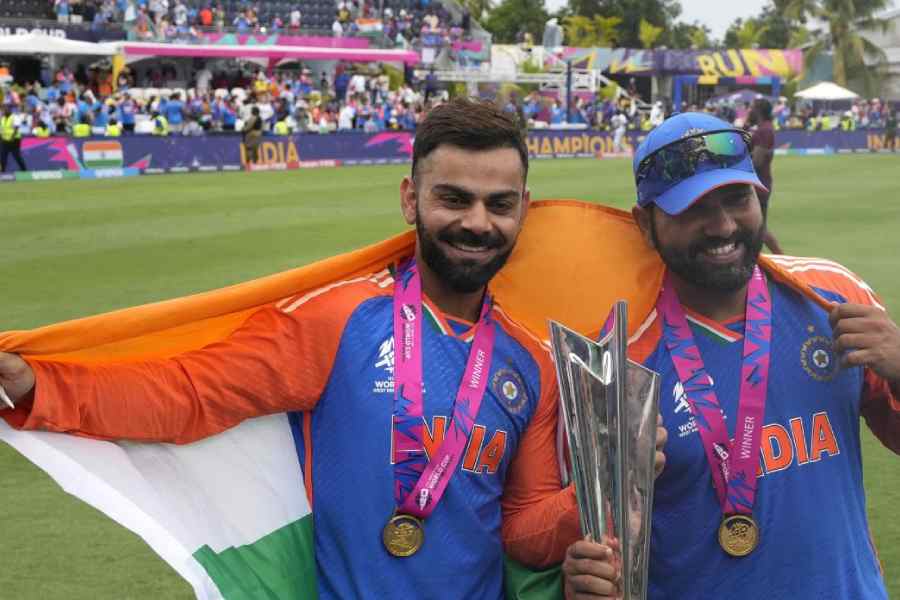A little after the players had stepped into the dressing room ahead of the prize distribution on Saturday, the Kensington Oval in Bridgetown was witness to one of the most endearing images of the World Cup.
Two of the greats of modern-day cricket who had previously been members of World Cup-winning teams, Rohit Sharma and Virat Kohli, were soaked in emotion while holding each other in a tight embrace.
The spearheads of one of India’s strongest-ever white ball sides had finally tasted the fruits of success together before deciding to call time on their T20I careers.
While Kohli made this known after receiving the Man of the Match award, Rohit announced it a little later at the post-match news conference. An association of more than 15 years had finally come to an end in the shortest format.
Another veteran, Ravindra Jadeja, also “bid farewell to T20Is” on Sunday.
For Kohli, it was an “open secret” that he wouldn’t continue beyond this showpiece event. The richness of talent coming through the ranks was behind his decision
to forgo the shortest format of the game.
“We have some amazing players coming through, and they have to take this team forward now,” Kohli said.
So the responsibility now lies with Rohit’s “garden mein ghumne wale bande” (a term he had used to endearingly refer to the youngsters in the team in an Instagram post in March) to steer the team through the transition.
Will the change in the top order affect India’s fortunes? Is there enough time to prepare the new group before the next edition of the World Cup at home in 2026?
Consider this: Following the 2022 World Cup in Australia and December last year, India played 23 matches, winning 15 and losing 7 while one match produced no result.
Neither Rohit nor Kohli were considered for the shortest format until a change of heart on the part of the national selectors led to their return for the three-match T20I series against Afghanistan in January 2024.
Still, a section within the board wasn’t keen on Kohli’s inclusion in the World Cup squad. A fabulous IPL and Rohit’s insistence paved the way for Kohli to make the cut.
The T20I series in Zimbabwe, beginning on Saturday (July 6) in Harare, will be the first step in the transition with Shubman Gill leading the group that could form the nucleus for the next few years. India’s future will be represented by Yashasvi Jaiswal, Abhishek Sharma, Rinku Singh, Riyan Parag and Dhruv Jurel.
T20 is a fickle format, with strategy and game-planning liable to change by the minute. This new generation has scant respect for averages and is driven by strike rates, realising the format rewards the buccaneers.
Jaiswal has been unlucky not to have got an opportunity this World Cup but there’s no doubting his class or ability to handle pressure.
Rinku’s qualities as a finisher too remained unwrapped on the big stage as he was among the reserves.
There’s the immensely talented left-handed opener Abhishek, and middle-order batters Parag and Tilak Varma who have shown the potential for making the next level.
The board believes in continuity, and Hardik Pandya is expected to retain his leadership role once the regulars are back in the side. Rishabh Pant too can be a contender.
Gautam Gambhir, widely tipped to take over from Rahul Dravid as the head coach, has worked wonders with greenhorns in the IPL and his experience should work to the team’s advantage. The series in Sri Lanka will be the first step in Gambhir’s project to build a team for the future.
For Rohit and Kohli, the 50-overs Champions Trophy in 2025 will be their next big challenge. But will the duo last till the next 50-over World Cup in 2027?
Rohit will turn 40 while Virat will be 38 then. Even if age and fitness permit, it is unlikely they will be looking that far. Nor might Gambhir be willing to wait too long to decide on his core group for the 2027 tournament.
The Champions Trophy could be their last outing in the 50-overs version, and both would again want to walk away as winners.










